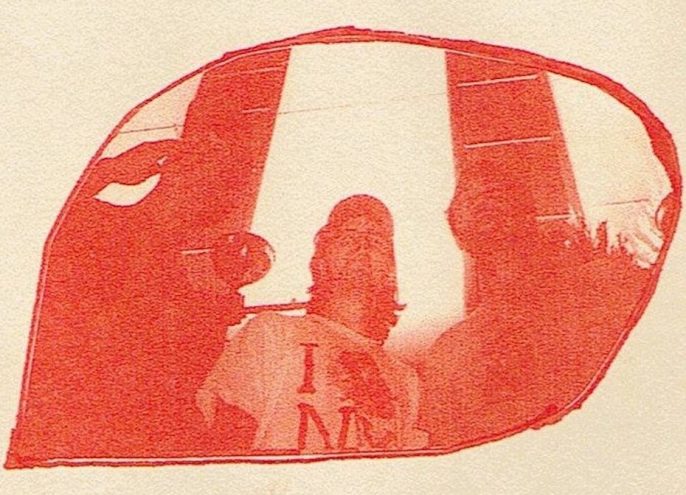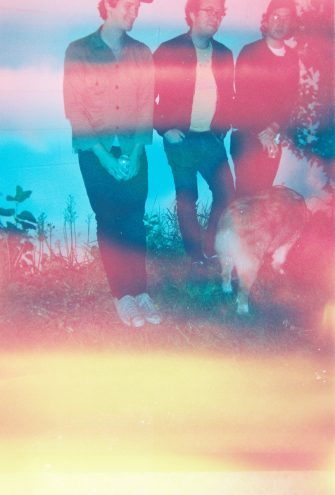A Mirthful Amalgamation: Woolen Men’s Raf Spielman on the release of Lucky Box

I arrive in Northeast Portland and Raf [Spielman] invites me up to his second story apartment. As I ascend the stairs I pass a vintage bike and some raincoats, upon reaching the landing there are records and art supplies everywhere. Finished canvases are leaning against walls and Brian Eno is playing out of the stereo. We walk out onto a balcony and Raf plugs in the string lights. The atmosphere is cozy and the view is great. We open some beers and start to discuss Lucky Box. Through this conversation with Raf, I learn about some esoteric bits about Woolen Men. I also realize that while Portland has changed over the past decade, and some people are having trouble coming to terms with those changes, it’s great to know that the music scene is still strong and vibrant in the eyes of it’s own community.
Eleven: Woolen Men put out Lucky Box pretty quickly, with a limited amount of pressings. I know the last album Temporary Movement didn’t exactly get the attention it deserved. Was the thought with Lucky Box to just get it out and be done with it?
Raf Spielman: It’s more the sense that it has become really hard to sell records for anyone who isn’t touring for months out of the year. We made 500 copies of the last record, and it’s kind of crazy like we still have a lot of copies. Working with a label, no one makes any money if you’re making less than 500 copies, so we decided to be reasonable about it. We’re working with See My Friends and they paid for half and we paid for half, so it’s like working with a label.
11: Speaking of making money, none of us are really making any. The journalists aren’t, the musicians aren’t. What’s your opinion on how the music business is run, any frustration?
RS: I’m definitely not frustrated. I don’t know. You kind of have to not think about that unless you’re like all in 100% and want to be famous. But if you don’t expect to make a living off of art… I don’t know, it’s reasonable. You have to think about your community too and the benefits that you get. I guess it’s not something that really frustrates me at all. I mean the fact that we can make records at all is great. Even on a small scale.
11: On that note, I am really blown away by the DIY community here (compared to Chicago, where I’m from). Being a Portland local, have you noticed much of a shift the scene?
RS: It’s just on a different trajectory. There’s way, way less house shows. It looked kind of bleak for a second there venue wise but it’s really good right now. There’s not as much all ages stuff which is kind of a bummer but if were talking about bands getting paid The know is a great venue, so is Turn Turn Turn, and The Fixin’ to. You can make good money playing at those places and they’re cheap and fun. To have three really solid venues is great, you know. And all the people who run these venues have been around for a long time and have been active in the music community.
11: Lucky Box features all previously recorded material. Why these tracks? Why a compilation album?
RS: We had done it before with a record called Dog Years that was actually the very first Vinyl we put out. It was made up of the first five or six tapes we had. We wanted to make stuff available again and it’s (Lucky Box) interesting enough on its own and it does say that they (the tracks) are from previous tapes but we kind of wanted to keep that secret. The idea is that you wouldn’t even know. I want it to be able to stand alone. I imagine someone in a record store picking it up and it being just a concept album to them, not a compilation.
11: What was the process of putting this all together.
RS: It was just going through all the tapes, as a band, together, and that was kind of the fun thing. All of those recording were made really quickly, almost automatically. We had to make decisions really fast. And in the moment when we were doing it we were kind of like “well ya know, I wish we would have done this instead”
11: You had regrets with how some of the songs turned out at the time?
RS: Yeah but once you have some time, it’s cool to be able to appreciate the rough edges or the accidents or the weird things that are in there. It ends up being exactly what you like about it. That it has a different energy.
11: Did any memories flare up while going through all the old tapes?
RS: What I liked about it was that it felt so long ago. There was nothing like that, which was really nice. It’s so far away, it was like another life. We recorded it so quickly and on our own. I’m usually pretty good about remembering where we did stuff but for some of the songs I was like wow I remember nothing. It was sort like this nice little mystery. It made it fun to choose the songs because we didn’t have any personal hang ups.
11: Were there any difficulties between you, Alex and Lawton in picking out the songs? Was there any bickering?
RS: A little bit of that. The funny thing is we always choose another person’s song, that that person doesn’t like it. It’s an ongoing thing.
 11: That’s pretty endearing though, that you’re championing each other.
11: That’s pretty endearing though, that you’re championing each other.
RS: Yeah yeah, it goes back to the same thing where there’s this tiny flaw in the song that you hate but it’s actually no big deal.
11: Speaking of songs, where do you pull inspiration from in the writing process?
RS: Something that I really appreciate about being in a band, that’s very…what’s the word.. habit based, is that band practice is always going to happen. It’s always a priority. So you have to have songs ready when practice comes up. It’s the pressure to create. If you know you have practice coming up and you don’t have something new, you’re just going to be staring at each other. You have to constantly be producing.
11: Do you collaborate on songs?
RS: The songs come together very collaboratively, music-wise. Lyrically however, when you’re practicing or playing live it’s hard to hear all the lyrics so it’s not actually until your recording that you hear all of the lyrics. We give each other a lot of space. It’s funny, there was one time I didn’t like the Lyrics on one of Lawton’s song and I tried to change it and the song just died. Haha it just killed it.
11: So it seems it’s best to just let the songs exist individually.
RS: Yeah yeah, like you don’t have to fix it. I’ll never do it again. Going back to where my inspiration comes from, over the years I’ve become more and more interested in clear lyrics. It’s very easy to be ambiguous. It’s very easy to hide behind ambiguity. I want to be clear and direct. From early on it was something Lawton and I really bonded over. Even before we had the band we would talk about songwriting and lyrics. It’s something that has always been really different and has been a struggle. In some ways it’s not very cool to make yourself vey clear and put yourself out there.
11: To digress for a minute go back to Portland—it’s a small town and the scene you find yourself in is even smaller. How do you think that affects Woolen Men? Do you think it plays to your favor, or not?
RS: In a funny way, I have appreciation for it… No one cared to hear us for like three years. We were playing some bad shows. It was a big deal if there was a write up for our shows. I’m glad that we had three years to figure it out. I’s cool for us now that, for example, this interview is happening and I didn’t have to bug you. I remember sending out so many emails just like begging to get a show, you know? It’s nice at this point that I don’t feel the need to please anybody, no responsibility to anyone. We do want we want to. I’m glad that we went through years of no big interest.
11: What’s next for Woolen Men?
RS: We are working on new stuff, new recordings. We’re really excited about it. It feels more like our own music than ever before. It won’t be as easy to spot the influences. People may not like it as much because it’s not as comfortable as before, like in the sense that they won’t be as familiar with it. You wonder thought, if people want that or if people just want what they like. At this point we’re in it for ourselves. I think that we’re all really happy though with where it’s going.
—
Woolen Men release Lucky Box via See My friends records on 8.31. They’re celebrating the album’s release with a show at the Spare Room on 9.2 with Honey Bucket and Months.




